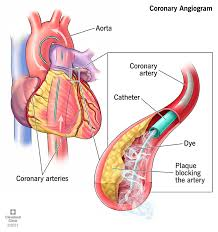A client is scheduled for a coronary angiography. In reviewing the client's record, what significant finding should the nurse report to the healthcare provider prior to this procedure?
A history of allergy to iodine.
Serum potassium level of 4.0 mEq/L.
Blood pressure reading of 138/90 mmHg.
An EKG that shows atrial fibrillation.
The Correct Answer is A
Choice a reason:
A history of allergy to iodine is a critical finding to report before a coronary angiography because the contrast dye used in the procedure typically contains iodine. Patients with an iodine allergy may experience severe reactions, including anaphylaxis, which can be life-threatening. Precautions such as premedication with steroids and antihistamines or the use of alternative contrast agents may be necessary.
Choice b reason:
A serum potassium level of 4.0 mEq/L is within the normal range, which is approximately 3.5 to 5.2 mEq/L for adults. Therefore, this finding is not significant and does not need to be reported to the healthcare provider prior to the procedure.
Choice c reason:
A blood pressure reading of 138/90 mmHg is slightly elevated but does not reach the threshold for stage 1 hypertension, which starts at 140/90 mmHg for individuals under 60 years of age. While it should be monitored, it is not an urgent concern that needs to be reported immediately before a coronary angiography unless the patient shows symptoms of hypertensive crisis.
Choice d reason:
An EKG showing atrial fibrillation is an important finding; however, it is not typically a contraindication for coronary angiography unless the patient is hemodynamically unstable or symptomatic. Atrial fibrillation can increase the risk of stroke, but anticoagulation management is usually the focus rather than postponing necessary diagnostic procedures.

Nursing Test Bank
Naxlex Comprehensive Predictor Exams
Related Questions
Correct Answer is D
Explanation
Choice A Reason
A creatinine level of 0.8 mg/dL falls within the normal range for adults, which is typically 0.6 to 1.2 mg/dL for males and 0.5 to 1.1 mg/dL for females. This indicates normal kidney function and is not a cause for immediate intervention post-operatively.
Choice B Reason
A potassium level of 4.2 mEq/L is within the normal range, which is generally between 3.6 and 5.2 mEq/L. This level indicates a stable electrolyte balance and is not a cause for immediate concern following shoulder replacement surgery.
Choice C Reason
A white blood cell (WBC) count of 9,000 mm³ is within the normal range, which typically spans from 4,500 to 11,000 WBCs per mm³. This suggests there is no active infection or inflammation that requires immediate intervention.
Choice D Reason
A hemoglobin level of 7.1 g/dL is considered low, as the normal range for adult males is generally 13.8 to 17.2 g/dL and for adult females is 12.1 to 15.1 g/dL. Low hemoglobin can indicate anemia, which may be due to blood loss during surgery or other underlying conditions. This requires immediate intervention to address potential oxygenation issues and determine the cause of the anemia.
Correct Answer is A
Explanation
Choice a reason:
Increasing fiber intake is crucial for clients with diverticular disease. A high-fiber diet softens the stool and helps it pass more easily, reducing the pressure in the digestive tract. Fresh fruits and vegetables are excellent sources of fiber and other nutrients essential for maintaining a healthy digestive system. The Dietary Guidelines for Americans recommend a dietary fiber intake of 14 grams per 1,000 calories consumed, which equates to 28 grams per day for a 2,000-calorie diet.
Choice b reason:
While avoiding foods high in sugar is generally good advice for overall health, it is not specifically related to the management of diverticular disease. There is no direct link between sugar intake and the symptoms or complications of diverticular disease. However, a diet high in sugar can contribute to obesity, which is a risk factor for the development of diverticulosis.
Choice c reason:
Decreasing fluid intake is not recommended for clients with diverticular disease. In fact, adequate hydration is essential when increasing fiber intake. Fluids help fiber work better by allowing it to absorb water and expand, aiding in easier passage through the intestines.
Choice d reason:
The previous belief that small seeds and nuts should be avoided by individuals with diverticular disease has been debunked. Recent studies have shown that these foods do not increase the risk of complications and are not harmful to individuals with this condition. Therefore, this advice is outdated and no longer considered necessary as part of dietary teaching for diverticular disease.
Whether you are a student looking to ace your exams or a practicing nurse seeking to enhance your expertise , our nursing education contents will empower you with the confidence and competence to make a difference in the lives of patients and become a respected leader in the healthcare field.
Visit Naxlex, invest in your future and unlock endless possibilities with our unparalleled nursing education contents today
Report Wrong Answer on the Current Question
Do you disagree with the answer? If yes, what is your expected answer? Explain.
Kindly be descriptive with the issue you are facing.
